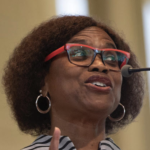
My spouse and I were the only two black people in the theater. There were no black actors or actors of color in the play.
We couldn’t understand why until the play’s end. We drove home chatting about how, sometimes, the best way to look at oneself is through a play.
Joshua Harmon’s timely satirical drama, Admissions, is one such production, and it’s showing at Speakeasy Stage Company in Boston through the end of the month. The play is not about the headline-grabbing college admissions scandal involving famous parents who cheated, bribed, and lied to assure their children’s entry into elite schools—like former Desperate Housewives actress Felicity Huffman and Full House star Lori Loughlin. While it is easy to dismiss this group of wealthy parents as depraved, morally bankrupt, and awash in white privilege, Harmon’s Admissions illustrates the length at which high-minded, politically correct, and supposedly “woke” white liberals will also go to get their children into top-tier colleges and universities.
Charlie, a graduating senior at a New Hampshire boarding school, gets wait-listed for Yale, a school he has dreamt of attending since childhood. The news flings Charlie into a tantrum that both shocks and appalls his progressive parents when it manifests as a racist rant. Charlie states he has better grades and SAT scores than his childhood best friend, Perry, who is biracial and was accepted to Yale.
“How the fuck did Perry Peters get into Yale, and Charlie Mason gets deferred? It’s so—I’m sorry, but it’s so unfair—I am drowning over here, OK? I am—because I am not one of those. I get that there are entitled white men who assume they get a seat without having to do anything to earn it, but I’m actually one of the people working really fucking hard to earn a seat, and every time I get close, it’s like, Ew! Not you! No one wants you here, fuck off.”
While Charlie doesn’t fully grasp how white privilege works at unbalancing a level playing field and disrupting any chance at fairness, his father, Bill, the school’s headmaster, rails back at his son’s sense of entitlement: “Life is not fair. It’s miserably unfair, but it’s not little white boys in private schools in New England who have it so bad. Look at Fortune 500 CEOs. Look at Congress. Look at—white guys run everything. Why is that, Charlie? Is it because white men are genetically predisposed to be geniuses?”
Charlie’s parents are bleeding-heart liberals who are not fully aware of how their own privilege, power, anxiety, and guilt send mixed messages to their son. While Charlie’s dad runs the boarding school, his mother, Sherri, is the head of admissions. Both parents are dedicated to having diversity in their student body—until, that is, it directly impacts Charlie. What parent doesn’t want the best for their kids?
As it plays out, the parents understand diversity more as a numbers game than as part of systemic change that could bring real results. In one example, Sherri admonishes a co-worker for having only three photos of students of color out of 50-plus in an admissions brochure; Bill, meanwhile, rejoices in a 20% increase in students of color compared to last year’s 9%. Both don’t see that adding more students doesn’t change diversity, but instead cloaks the school’s status quo.
[Ed. note: Spoiler alert] The pivotal moment in the play is Charlie’s solution to addressing his white privilege moving forward in life: to withdraw all his college acceptances, attend community college, and donate his college tuition to endow a scholarship for a student of color at the school. The parents are apoplectic with rage, and contact their well-connected friends to overturn the decision. This is how Harmon pushes white liberals to look at how easily they can talk the talk without walking the walk.
ADMISSIONS RUNS THROUGH 11.30 AT SPEAKEASY STAGE COMPANY, CALDERWOOD PAVILION, BCA, 527 TREMONT ST., BOSTON.
Rev. Irene Monroe can be heard on the podcast and standing Boston Public Radio segment ALL REV’D UP on WGBH (89.7 FM). Monroe’s syndicated religion columns appear and the Boston voice for Detour’s African American Heritage Trail. She is a s a Visiting Researcher in the Religion and Conflict Transformation Program at Boston University School of Theology.

